Work, Meet, Learn, Roll
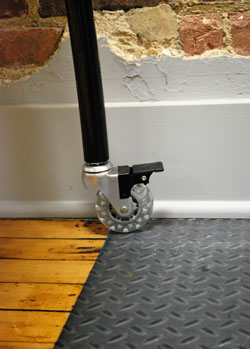
A confluence of textures at the Workantile Exchange. The wheels on the table legs let them glide across the predominantly hardwood floors to wherever they need to be.
What kind of “helpful” customer rearranges whole shelves of technology books at Borders – because the downtown Ann Arbor bookstore has them organized in a less-than-optimal way? Trek Glowacki.
For that sort of book rearranging, Glowacki is supported by the credential of a master’s in library science from the University of Michigan’s School of Information. Plus, the “self-described information problem solver” spends a lot of time at Border’s. It wasn’t some kind of drive-by book reorganization.
Given that Glowacki is inclined to reconfigure the space he inhabits – even if it’s a public space – it’s not surprising that he and his colleague, Jesse Sielaff, wound up using the Workantile Exchange as the venue for a course they taught recently.
That venue is a new coworking space at 118 S. Main Street in downtown Ann Arbor – a space furnished mostly with chairs and tables on wheels. It’s intended to be easily configured by the members of the Workantile Exchange to suit the specific needs of a particular project on a particular day.
The 3,000 square foot Workantile is partitioned into a very public area towards the front (just behind the new Mighty Good Coffee storefront), private areas for phone calls, plus a conference room towards the back.
But it was Workantile’s 800 square foot Training Loft that Glowacki and Sielaff used to teach their 5-week Ruby on Rails course. That course concluded on Thursday – the same day that Ann Arbor public schools wound up their year.
What’s Ruby on Rails? [Hint: It's not a Wizard of Oz mass transit system.] And how does teaching classes fit into Workantile’s culture of coworking?
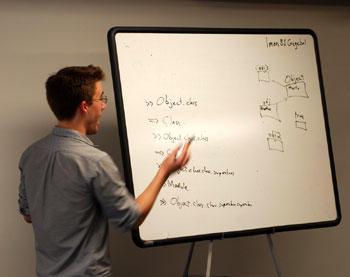
Jesse Sielaff at the whiteboard. (Image links to larger file). Over the five-week course, as the Workantile Exchange was built out, the white board on the easel would be replaced with a whole wall covered in white board.
The Ruby on Rails Class
Ruby on Rails is a web programming framework.
Glowacki and Sielaff’s course was designed for people who had some programming background. So when Glowacki quizzed the 16 students on the first day of class about their No. 1 programming language, the answers that came back were multiple instances of C++, Perl, Java, PHP, plus even one MATLAB.
The teaching pair had run a course for non-programmers several times before at UM’s School of Information. So Glowacki was concerned about finding a good pace of presentation – he asked students to not be shy about providing feedback on that. His invitation to throw tomatoes, if that’s how they felt, was met with the deadpan query: “Will there be a break so we can get tomatoes?”
During the times we observed the class in session, we did not witness the launch of any vegetables.
For most of the first hour of class, it was Sielaff who wielded the marker at the dry erase board. But Glowacki would add bits and pieces of his own commentary – the pair’s pedagogical style truly merits the label “team teaching.” They’re able to complete each other’s sentences in a seamless, unobtrusive and non-disruptive way.
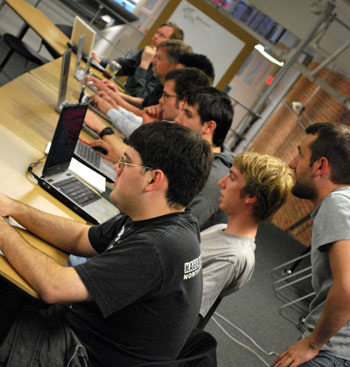
Trek Glowacki, at right, checks out the results from Brian Nixon's screen. In the foreground, Brett Higgins.
It’s clear they both share an affection for the Ruby programming language. There’s not so much love for PHP. Outside of class, Glowacki explained to The Chronicle that the “concept space” of PHP was overly complex, and the language lacked a design aesthetic. For looping, Glowacki said, PHP used a special syntax to accomplish it. Ruby, on the other hand, is designed in a way that the kind of things that need to be looped – namely, collections of things – know how to loop themselves.
On the last day of class, seven students had persisted until the end, and Glowacki pointed them to a URL where they could take a survey to give feedback on the course. Some of them, like Brian Nixon, provided the feedback directly: “I would recommend you guys for anything.”
In addition to the survey on the course, Glowacki asked students to take an online survey about the Training Loft space where the course had been taught.
The Workantile Exchange as a Training/Meeting Space
The course offered by Glowacki and Sielaff was free this time to students. But that’s not a sustainable model for the future – for the two teachers or the Workantile Exchange.
As The Chronicle reported back in January, the Workantile coworking space is a venture by Michael Kessler to adapt the former Arcadian Too antique store space to a modern use. (The old Arcadian Too sign still designates parking for the building in the rear).
View from the overhead webcam at the Workantile Exchange. It's looks to be early in the day in this photograph, with most of the rollable tables still arranged against the wall.
Rather than recruit “anchor tenants” for the space, Kessler wants to anchor it with meetings, classes and events. So the Training Loft used for the Ruby on Rails course is a key part of the economics for the Workantile. The meeting areas, like the Training Loft, can be used for a fee by non-members and reserved by members.
Currently, individual memberships are priced at $100 a month, require a three-month commitment and a $50 set-up fee.
From what we’ve observed so far – as the venture has gotten up and running over the last couple of weeks – individual Workantile members can be found mostly in the vast open area just behind the Mighty Good Coffee storefront, an area called The Parlor.
Every evening during this initial phase, Kessler shoves the rollable tables in The Parlor against the wall and pins the chairs behind them. That means that members who show up to cowork will need to actively configure their space to work, instead of just accepting what was left from the day before.
An overhead webcam is documenting the table configurations actually used by the members. The idea is to try to identify patterns of use that could inform decisions about how to invest in any additional amenities.
Over the last week, there’ve been several potential members drop by to work for a while just to try it out. For some, it’s been a little hard to assess what working there will be like, as the some of the construction on the Mighty Good Coffee storefront has created some noise that presumably won’t be typical.
The frontmost part of The Parlor is separated from the sidewalk of Main Street only by a plate of glass. It can work as a vantage point from which to watch Main Street pedestrians. It’s where some of the words for this article were written. And where some future words for Chronicle articles will be written.
[Editor's note: Dave Askins pays for an individual membership in the Workantile Exchange.]




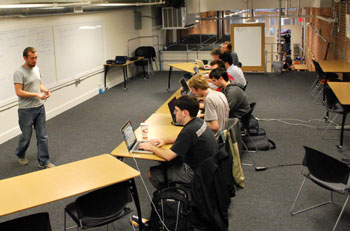
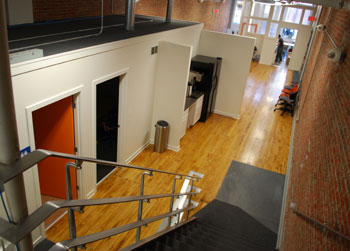

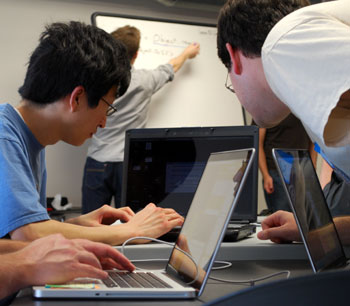
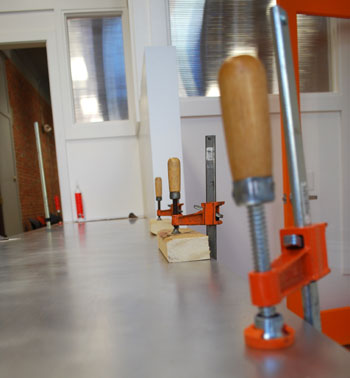
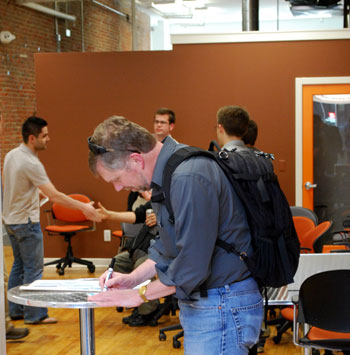
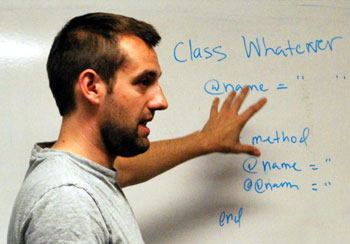
Jesse and Trek did an excellent job teaching this class and I highly recommend it to anyone who wants or needs to learn about the Ruby language and Rails framework. Underlying the course was a design and development philosophy which web developers would do well to follow.
Workantile, of which I am a member, is evolving into a really vital community. Though its primary mission is to support independent workers, freelancers, and so forth, even people who are employees of companies and a certain large university are finding value and joining it.
Hey, there is no apostrophe in “Borders”. Thanks.
Re [2]: Thanks, fixed.